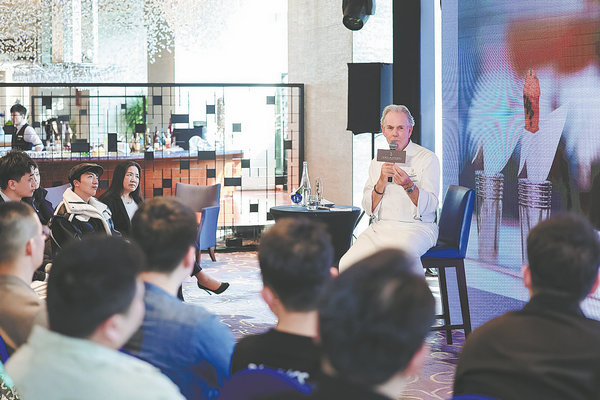

With 16 years of experience under his belt, Wang is perpetually in pursuit of fresh, creative ideas and eagerly enrolled in Keller's master class as soon as he learned of it.
Keller's personal journey, particularly his humble beginnings as a dishwasher, resonated deeply with Wang. "I was so inspired by the story Keller shared with us because, like him, I also started my career as a dishwasher," he says.
The chef's enduring passion for cooking, despite his years in the industry, also strikes a chord with Wang. During the class, Keller divulged the intricacies of managing a kitchen in a three-Michelin-starred restaurant and the process of conceiving new dishes.
Wang was particularly captivated by the American chef's transformation of the simple donut into a dessert worthy of Michelin acclaim.
"He reminisced about his daily ritual of enjoying a cup of coffee with a donut and how one day, that routine sparked the inspiration to elevate the dish. He pointed out that sometimes, we overlook the potential in everyday foods," Wang says.
This was Keller's first trip to Beijing, although he has visited Shanghai and Hong Kong before. When he lived in New York, he liked to eat in Chinatown and during this trip, he got the chance to try authentic Chinese cuisine.
Keller says he feels connections with China, a bond born in 2016 when a vendor introduced him to Kaluga Queen caviar from China. Since that pivotal moment, all his restaurants have exclusively used Chinese caviar, eschewing sources from elsewhere.
"For a long time, we haven't had wild caviar, so the best farmed caviar in the world is a brand from China. There's no question," Keller says.
Keller's admiration for caviar runs deep. Many of his signature dishes incorporate it as an essential component, rather than just as a garnish. At his two three-Michelin-starred restaurants, he uses between 1 and 1.5 kilos every day.
During this trip to China, Keller teamed up with Da Dong, a pioneer of cuisine nurtured by Chinese aesthetics and Weng Yongjun, a master of Chinese culinary arts. Together, they created two special "four-hands feasts", with caviar as a key ingredient.
The partnership is believed to be a reflection of the essence of both Chinese and Western culinary traditions, while also exploring the potential for innovative fusion.